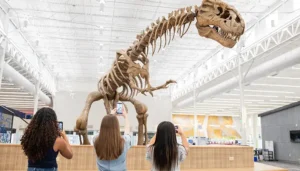WE NEED TO TALK ABOUT THE DINOSAURS
Editor, Baptist and Reflector
 I just wanted to know when dinosaurs lived.
I just wanted to know when dinosaurs lived.
That’s it. That was the most profound biblical mystery swirling in my head when I began seminary. I landed in the survey class of a professor considered one of the Southern Baptist Convention’s foremost Old Testament scholars at the time. Surely, he’d know about dinosaurs.
About 15 minutes into the first session, he paused and, with a condescending, exasperated tone, said, “And every semester I have somebody who asks me when dinosaurs lived.” About 50 students guffawed.
Not me. I sat frozen. Shocked. I felt exposed as a fraud. How could he have known I was going to ask that? I shut down and moved to the back row for the next 16 weeks. My one takeaway from that class is the memory of silent humiliation. “How could I be in seminary,” I thought back then, “and not know something so apparently basic as when dinosaurs lived?” Did God call the right person? Was I even saved?

My experience reflects a larger problem in many Tennessee and Southern Baptist Convention churches. Youth and adults sit silently with unasked and unanswered questions for fear of someone incredulously saying, “You don’t already know that?” It happens. I’ve heard it.
Southern Baptists emphasize biblical preaching, evangelism, and missions, but how the Bible intersects with today’s challenges receives far less attention.
Candid discussions about mental health, divorce, adultery and restoration, sexual identity, homelessness, social and racial justice, human suffering, struggles with doubt and faith, and a host of other issues are largely absent in a church context.
Churches often aren’t places where people feel they can ask hard questions, but they ought to be. Unfortunately, as one pastor shared, attempts to address those topics often devolve into political discussions.
The inability or failure to encourage and meaningfully engage with people’s questions have negative consequences. Research shows people, especially younger generations, who are unable to obtain understanding from within the church, turn elsewhere for answers.
Consider the topic of spiritual doubt, the seedbed for faith deconstruction, a growing trend among people under 35 (primarily Millennials and Gen Z). Faith deconstruction is driven by intellectual, emotional, or moral conflicts, such as unresolved questions about doctrine, hypocrisy in religious institutions, or misalignment with cultural values.
A 2023 Barna Group study highlights the issue: 42% of U.S. adults, including 37% of current Christians, have deconstructed their faith, with only 18% seeking help from pastors. Over the past 30 years, 40 million Americans have left churches, with younger generations disproportionately affected.
Some reasons for walking away include lack of open dialogue, disillusionment with church culture and leadership, lack of sound biblical discipleship, struggling with hard questions about God’s justice, and an emphasis on emotional experiences versus intellectual engagement with Scripture.
One pastor said people’s “reticence” often comes because of “our tendency to preach along political or cultural lines, emphasizing certain ‘pet issues’ over the whole counsel of Scripture.
For instance, if I’m railing against homosexuality, the person struggling with that will be less likely to come to me with questions about that issue. We shouldn’t avoid preaching about sin, but we must preach with compassion and understanding and emphasize our openness to questions to provide biblical counsel on any topic or issue.”
Another pastor added, “The Bible doesn’t hide the questions of man. God can handle our questions and welcomes them. A healthy church culture is where there is freedom to doubt and ask questions.”
So, what are some practical ways churches and ministers can foster a culture that encourages and supports questions and discussions on difficult topics? These seven suggestions are drawn from expert recommendations, emphasizing empathy, openness, and community to help reduce frustration and build resilience, especially among younger generations.
- Establish safe spaces for open dialogue: Welcome tough questions. Create dedicated forums, small groups, or anonymous Q&A sessions where people can voice doubts or questions without fear of judgment, allowing for honest exploration of topics like faith crises or sexuality.
- Train leaders in empathetic listening: Equip pastors, ministers, Sunday school teachers, and volunteers with skills to actively listen to concerns about difficult issues, responding with compassion that engages conversations rather than quick answers or dismissals that shut people down.
- Incorporate difficult topics into sermons and teachings: Regularly address real-life challenges like doubt, sexuality, or cultural shifts in messages, using Scripture to guide discussions.
- Differentiate healthy doubt from harmful deconstruction: Educate the congregation on the value of questioning as a path to deeper faith, while providing biblically sound tools to constructively strengthen beliefs.
- Offer mentorship and support for those in crisis: Pair individuals who have tough questions with mentors who can provide guidance and reduce isolation.
- Use panels and guest speakers: Host discussions or panels with experts to normalize tough topics and provide biblically balanced and informed responses.
- Provide resources for self-guided exploration: Offer books, podcasts, or online tools on topics like doubt and sexuality, encouraging personal study while facilitating group follow-ups to discuss findings and unanswered questions.
It’s not enough to simply preach the gospel.
A clear understanding of the gospel’s implications in every facet of life is desperately needed and requires objective and open dialogue.
It’s not easy, but we need to talk about the dinosaurs. B&R
- Filed Under: Opinion Column
